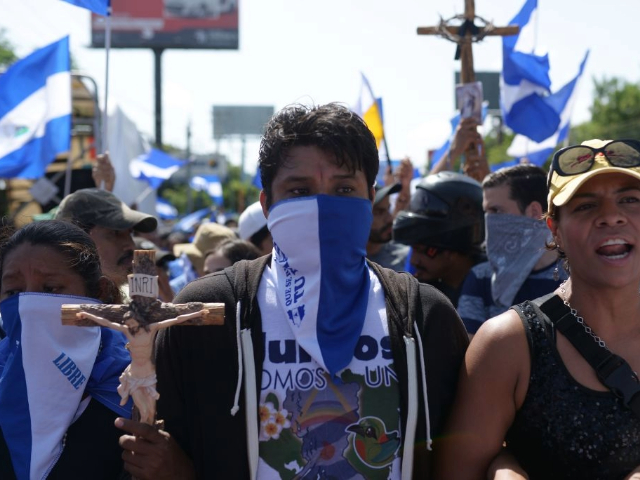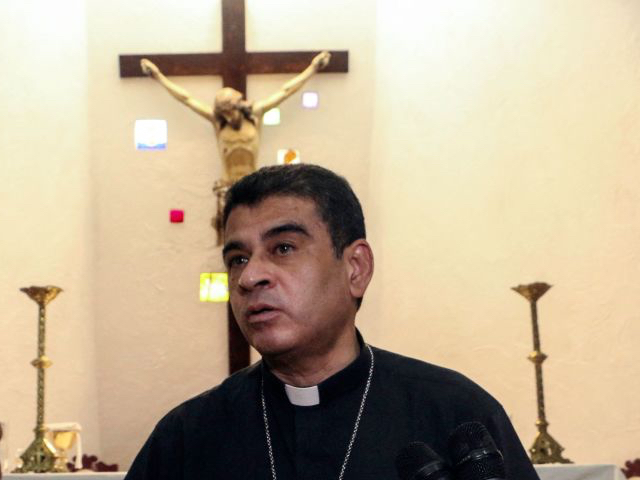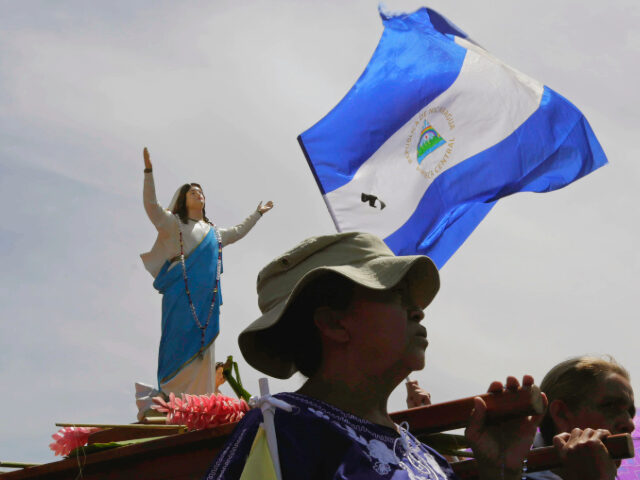Catholics in Nicaragua — often anonymously — told outlets in the country that the communist Sandinista regime threatened to arrest anyone attempting to engage in public celebrations of the feast day of Our Lady of Guadalupe, the feast of the Immaculate Conception, and other Christian holidays leading to Christmas.
The Nicaraguan newspaper La Prensa, citing former political prisoner and activist Félix Maradiaga, reported on Friday that Catholics had denounced more than 20 instances of local police in the country warning them “not to participate in any public activity of the Catholic church.” Maradiaga claimed that the regime of Sandinista dictator Daniel Ortega is forcing a large number of Catholic laymen to report regularly to local police stations to monitor their activities; this is where many say authorities warned them against public celebrations.
Ortega has engaged in a years-long violent crackdown against the Catholic Church in the country since 2018, when anti-communist protests erupted in the country, calling for political change. Ortega responded to the peaceful demonstrations, often led by students, with widespread police brutality. The Sandinistas turned on the Church when priests and other church leaders began offering refuge to injured and persecuted students and other protesters, arresting bishops and torturing Christians suspected of aiding the protests. The Ortega regime is estimated to have killed more than 300 people in the peaceful protests of 2018.

People wait for the arrival of the students of the National Autonomous University of Nicaragua (UNAN), who hid overnight in a church during an attack by government forces at the Cathedral in Managua on July 14, 2018. (MARVIN RECINOS/AFP via Getty Images)
In subsequent years, mass arrests of both clergy and Catholic laypeople have defined the religious policy of the Sandinista regime.
Maradiaga told La Prensa:
In this month, in the context of the celebration of the [Immaculate Conception] and the celebration of the Virgin of Guadalupe, we were called to the attention of those who denounced – the patrons in the departments such as Madriz, Nueva Segovia, Matagalpa, Masaya, and Managua, [that] the police has asked them not to participate in public festivities.
The people being intimidated, he claimed, were Catholic laypeople who were “forced to present themselves on a daily basis, ‘voluntarily,’ to the nearest police station.” Once there, he added, police officers warned them “not to participate in any public activity of the Catholic Church.”
The repression in December is part of a larger pattern of eliminating the Church from the public sphere. A recent report by attorney Martha Patricia Molina documented 3,224 religious activities banned by Ortega between April 2018 and December 2023 and 667 direct aggressions against the Catholic Church.
Molina explained to another Nicaraguan outlet, IP Nicaragua, in a report on Thursday that Ortega had unleashed a multifaceted assault on Catholicism in the country: first, “an express order from the Migration [agency] to not allow any religious person in the country;” second, “the banning of processions” and other religious activities; and third, “the maintaining of a bishop in prison sentenced to over 26 years in prison, a bishop in exile, and finally a silenced and fearful Episcopal Conference.”

In February, the Oretag regime sentenced Nicaraguan Catholic Bishop Rolando Álvarez to 26 years in prison for “treason.” (STR/AFP via Getty Images)
Molina described 2023 as “the worst year for the Catholic Church” in Nicaragua in recent memory.
Like most of Latin America, Nicaragua is majority Catholic. About half the population identifies as Roman Catholic, 33.2 percent as Evangelical Christian, and another 2.9 percent as other religions; nearly 85 percent of the population is Christian.
As a result, rather than eliminating Christianity from the public eye completely, Ortega has opted to hijack it, leading socialist “Christian” events.
December is typically a busy month for Catholics, as it contains the holy season of Advent and several prominent feast days. In Nicaragua, the holiday season begins in late November with the Feast of the Immaculate Conception. Catholics in the country maintain a tradition that, in 2023, ended on December 8, in which they take the streets for call-and-response worship and street processions attracting hundreds. Ortega reportedly shut down a large number of such local celebrations in 2023, and those permitted occurred under the watchful eye of the communist regime, attracting much smaller numbers.
The Nicaraguan outlet Confidencial reported on December 7 that local parishes received word from the communist regime “for weeks” that they were not to allow public celebrations for the Feast of the Immaculate Conception: “Everything should be inside.”
“Nothing to do but pray,” one member of the faithful, identified only as “José,” told the outlet.
Many prayed secretly in their homes and dedicated their prayers to Bishop Rolando Álvarez, a Catholic leader Ortega sentenced to 26 years in prison in February for alleged “treason.” Ortega also took away Álvarez’s Nicaraguan citizenship, rendering him a stateless person — a violation of international law. Álvarez’s harsh sentence followed his attempted exile, along with 222 others, to the United States; Álvarez refused to leave his homeland.
Ortega and his wife, Vice President Rosario Murillo, also organized their own socialist version of the event.
Similarly, Murillo led an event to mark the Feast of Our Lady of Guadalupe, in which she used her remarks to condemn the Catholic Church and leaders who oppose widespread state violence as demonic.
Describing political dissidents within the Catholic Church, Murillo said, “Those are not religious leaders; they are not representatives — not of God, not of our saints, not of our Mother Mary … there was perversion, malignancy; this was the devil’s cauldron, and we know where they were.”
Murillo celebrated “Christian love” as explicitly “socialist” in her remarks and accused Nicaraguans opposed to her regime in exile of “terrorist hate.”

COMMENTS
Please let us know if you're having issues with commenting.